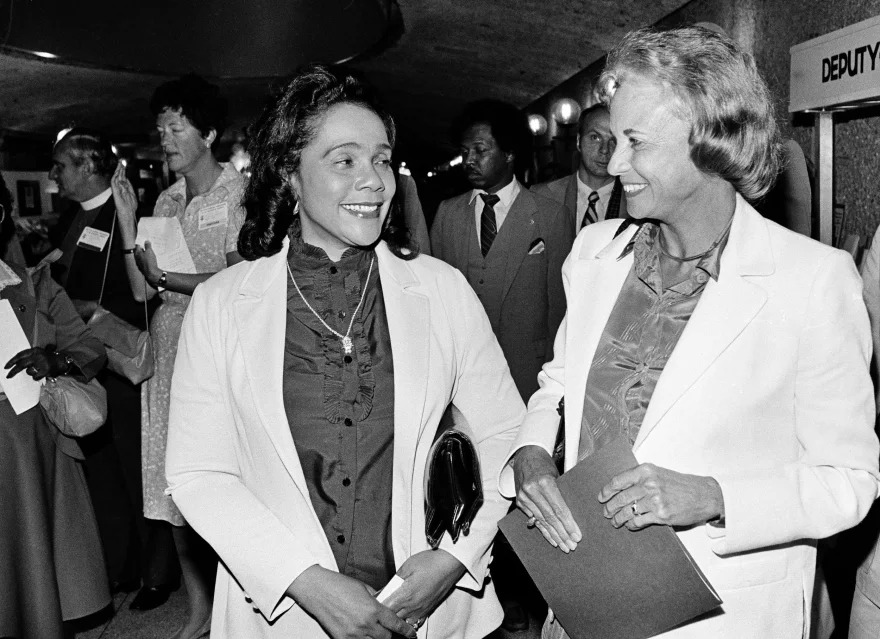
Justice O’Connor with Coretta Scott King at The Episcopal Church’s General Convention in New Orleans in 1982. Photo: Jack Thornell / AP
I join with a full and grateful heart in the tributes to Episcopalian Sandra Day O’Connor. A knowledgeable friend told me today she wouldn’t admit that her seminary training at Yale informed her jurisprudence. But her famous swing votes bespoke a broad Anglican view. A conservative-leaning associate justice seated by Reagan, she stood up for women, refining but protecting Roe. I like to imagine her smiling while telling Samuel Alito to look her in the face should he insist on arguing that he could not locate her right to bodily privacy and autonomy in the Constitution.
Her most fateful swing to the right was in December 2000, when she joined her conservative colleagues in blocking a statewide recount of Florida’s 61,000 undervotes, handing the election to George W. Bush over Al Gore. It was the first time this century the popular vote winner would lose the White House. Trump-Putin-Pence 2016 was the second. Next year could be the third — and possibly the last United States election ever, should Trump win in the Electoral College and compete the program of despotism and tyranny that he began when he tried to kill our country in 2020-21.
In Bush v. Gore, decided by a 5-4 vote, justices said that since Florida counties’ procedures differed, a recount would violate the 14th amendment’s Equal Protection Clause. You could say that about most of the U.S.’s 3000-plus counties in every national election, for course. But the Anglican associate had swung again, and Gore conceded. I’ve read what she wrote about the case and wouldn’t dream of second-guessing her unless I thought I could look her in the face and make a wiser argument.
And yet President Gore might have been more attentive to the interagency rivalries that kept us from finding the Sept. 11 terrorists in time. Had the attacks occurred anyway, I doubt Gore would have overreacted with wasting wars in Afghanistan and Iraq. I don’t mean to lay any of that at her feet. She doesn’t deserve it. But great leaders’ decisions by their very nature have vast and lasting consequences, and asking what-if helps us learn.
And we learn one more lesson from Bush v. Gore. Having a president who lost the popular vote, and who took office only thanks to a Supreme Court that appeared split along partisan lines, enraged Democrats. But they didn’t take to the streets. They didn’t threaten civil war. The only violence I can recall from 2000 was Trump’s friend Roger Stone organizing a mob to storm the Dade County registrar of voters, a trial run for Jan. 6. Yet now we hear that we have to keep Trump on the ballot, notwithstanding the clear constitutional ban on insurrectionists in federal office, because otherwise we’d strain the bonds of union. Let’s be clear what that really means. As so often happens with the bully Trump, we’re being warned to be afraid of criminal violence.
But that will only happen if Trump’s disappointed supporters are less law-abiding that Gore’s were. So here’s an idea, judges, Anglican or not. Follow the clear meaning of the Constitution, as O’Connor tried her best to do — and if people don’t like it, and they break the law and take up arms against their country, be prepared to meet them with a firm, fair hand and then hold them accountable for their crimes.
